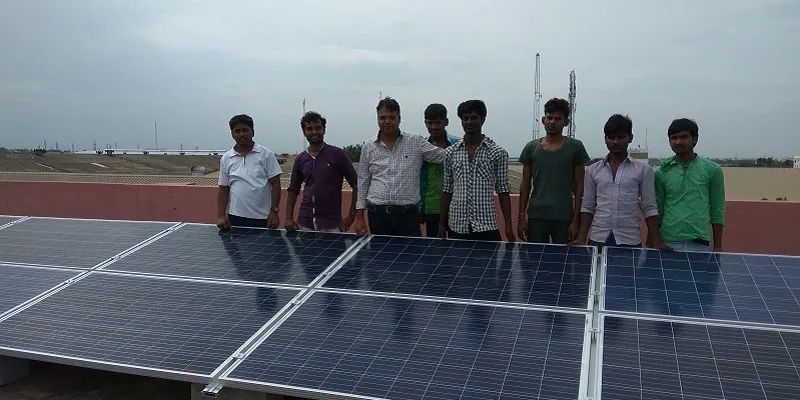Cut your electricity bill with Solgen
In order to ensure reduced cost of electricity and to bring energy conservation, Solgen Tech was started in Mumbai.
Terms like 'climate change' and 'energy conservation' are no longer bandied about just in conferences on environment; it’s an everyday reality. Wishing to address this shift, and a deep love for entrepreneurship and passion for solar power made management professionals and friends for over a decade Amit Shah and Brijesh George start Solgen Greentech, a year-and-a-half ago.

Based out of Mumbai and having presence in different parts of Maharashtra, Solgen provides solar solutions for residential, industrial and commercial spaces. The team installs and commissions the entire project and also trains the end user on its usage. Its main initiative currently is the reverse net meter, which not only conserves electricity but also reduces the cost of consumption. Amit 33-year old says,
“We decided to focus on the small efforts that add up to provide a larger benefit. Shortage of electricity and high power bills will no longer be a concern with a good solar system. Building our company from ground level, we believed that there are no limits to what can be accomplished, given sufficient resources and motivation.”
The beginnings
An engineer, Amit has worked in senior management position of various accountancy firms prior to starting Solgen. Brijesh (34) has worked as a commodity trader in London prior to joining forces with Amit. Solgen Greentech has a core team of 10 people, whose experience span across energy engineering, project development, business development and feasibility study of energy supply for commercial and industrial facilities.
“In 2014, we were impressed by how Gujarat had adopted the use of solar energy. We wanted solar energy to be a regular and cheaper alternative than traditional energy source. What better than actually setting up a solar firm,” asks Amit.
Being an engineer, Amit had the basic idea of how to build the reverse net meter, but he nevertheless did a course on solar panelling at IIT Bombay.
The workings
“The first society we worked with was my own apartment complex. It was a long-winded conversation, as educating and convincing people of the need for this change is always a challenge.
We successfully implemented the first-ever residential rooftop solar ‘reverse net’ meter (two-way import and export) solution in North Mumbai. The site is located at Arkade Bhoom Heights
building at Kandivali West, and the utility provider is Reliance Energy,” says Amit.
What helped the team was a regulation introduced by the Maharashtra Electricity Regulatory Commission (MERC) for rooftop solar photo voltaic systems in September, 2015. Under this regulation, solar power plant can be installed on rooftop of residential premises, societies and synchronised with the electricity grid.
The power units generated by the solar power panel installed in Arkade Bhoomi is supplied to the common grid and can then be deducted from the monthly consumption of power units from the distribution company (DISCOM), Reliance Energy in this case. Such systems are also easily compatible with other DISCOMs like BEST, Tata Power and MSEDCL.
This is how it works: the net meter measures the electricity units consumed by the users through the conventional electricity line from the utility grid (DISCOM) and export the electricity units given to the utility grid. The excess units generated by a solar power are then put on the distribution network for public consumption.
The benefits
“After implementing the initiative in March 2016, the society's monthly power bill has reduced by approximately 40 percent (before implementation of net meter). That's approximately Rs 14,000 in the first month itself,” says Amit.
The society produces approximately 1,200 units of solar power every month and its average consumption is approximately 3,600-3,700 units. The benefit of this technology is two-fold: it not only saves cost substantially, but by generating solar power, individual housing societies also make a humble contribution to a better environment.
In the first year, the team claims to have done more than 100kW projects and their turnover for the year was approximately Rs 75 lakh. This year, till now, the company has done over 250kW and targets to complete 800kW or more.
The team works with housing societies, commercial and industries. “We help all large engineering, procurement and construction (EPC) contractors by providing installation and commissioning services in a short time. We also offer financial support to industries for setting up solar power plant by converting their monthly electricity bill into EMI for solar power investment,” adds Amit.
Revenue and future
Solgen generates its revenue through the installation and commissioning of the project and also revenue from annual maintenance contract (AMC) from installed projects. Their clients include RBI Mumbai, Western Railway and many other reputed institutions.
The current government is promoting the use of renewable energy and most solar panel manufacturers are banking on this push. A report by Quint says that the current installed solar power capacity is at approximately 6,762.85MW and the target for 2022 is 100GW.
A report by FICCI suggests that over $1.6 trillion has been invested in clean energy since 2004 and investments grew at a CAGR of 22 percent from 2004 to 2012. There was, however, a drop in investments in this space as the prices of solar and wind equipment fell and less capital was needed. There was also a dearth of funding in 2012.
“We plan to bring solar to every household and every commercial building in India, thus making it to stand out as a green country, in addition to resolving the massive power shortage issues currently faced throughout India,” says Amit.
For the team to achieve this goal, the primary step was to tie up with financial institutions to secure financing for individuals and businesses to finance a solar plant at their residence. “We strongly believe that solar energy will bring a renewed revival to India in the forefront of electricity,” Amit explains.







